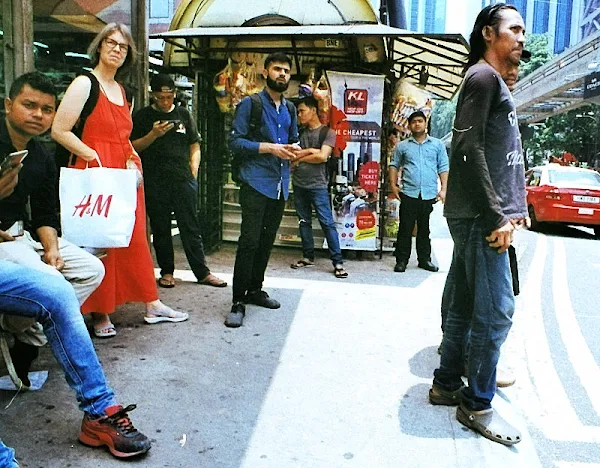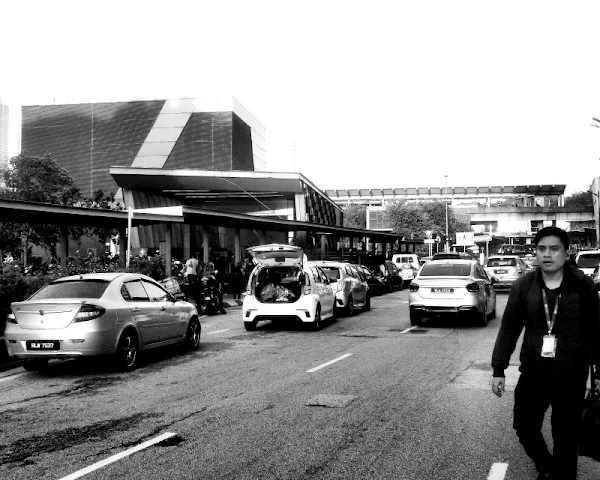Search ImagingPixel for Images by Camera or Lens
Tuesday, December 31, 2024
Photo of the Day
Monday, December 30, 2024
FinePix S2 Pro, AF Zoom-Nikkor 35-70mm 1:3.3-4.5
Another quick session with the Fujifilm FinePix S2 Pro, mounted with the AF Zoom-Nikkor 35-70mm 1:3.3~4.5, a digital SLR camera and lens combo that should appeal to both vintage and/or CCD enthusiasts. Vintages as both the camera and lens are way past their production timeline, which was from 2002 to 2004 for the FinePix S2 Pro, and 1986 to 1989 for the Nikon AF Zoom-Nikkor 35-70mm 1: 3.3-4.5 (MKI). Both the camera and lens were made in Japan.
Interest and enthusiasm for the camera is centered on its F-mount lens system and the 3rd-generation 6.1MP 'Super CCD' sensor, which is capable of producing 12.1 million (4,256 x 2,848) pixels of interpolated image.
The FinePix S2 Pro, introduced two years after the original FinePix S1 Pro in 2002, is built on a Nikon N80 film camera body based on a 'Frankencamera' concept, common during the period, where components from two or more manufacturers are fused together to make the whole. In the case of the S2 Pro, the upper body part and exposure controls, together with the lens mount based on the Nikon D80 (F80) SLR film camera body, while the image sensor and its management routines are by Fujifilm.
Unlike the later S3 Pro, which requires a set of 4xAA batteries to operate, the S2 Pro, which can be considered still in the infancy stage of its development, requires two sets - a pair of C123As for the Nikon body side and a pack of 4xAA batteries for the Fujifilm integration.
The AF Zoom-Nikkor 35-70mm 1:3.3~4.5, despite being nominated as one of Nikon's 10 Worst Lenses by Ken Rockwell, is still a fine and capable (as can be seen with these images) performer. The lightweight, with 8 elements in 7 groups and 6 aperture blades in an all-plastic, with a metal-mount body, has a minimum focusing distance of 0.5 meters normally (0.35 in macro mode) and takes 52mm filters.
Iterations of the AF Nikkor 35-70mm 1:3.3~4.5 include the MK I, which was manufactured in Japan from 1986 to 1989, and the MK II, from 1989 to 1994. The MK II was initially manufactured in Japan (serial number starting with #4) before production was shifted to Thailand, with serial numbers starting with #5.
The S2 Pro, despite its age, is still a smooth operator and a delight to work with, with the simple and direct controls on the front of the camera a testament to its heritage, and the management of the digital imagery at the back of the camera the potential of things to come. The 35-70mm AF Nikkors are downright low-priced, easy to come by on the auction listings, and should give the enthusiast ample opportunity to be both creative and experimental.
Personally, I have been through 3 (three) of the S2 Pros, bought, tested, used, and sold. All three units displayed the 'ERR' message when only the C123A batteries were installed, and were fully functional with the additional 4xAA battery pack deployed, something to read between the lines when looking up low-end listings of the camera.
Vintage Camera Marketplace by ImagingPixel

Friday, December 27, 2024
Photo of the Day
Vintage Camera Marketplace by ImagingPixel

Thursday, December 26, 2024
Photo of the Day
Vintage Camera Marketplace by ImagingPixel

Wednesday, December 25, 2024
A Very Merry Christmas and Happy Holidays, Everybody!
Tuesday, December 24, 2024
Photo of the Day
Vintage Camera Marketplace by ImagingPixel

Monday, December 23, 2024
A Re-Edit: Olympus OM-2S, Olympus OM Zuiko 21mm 1:3.5
Film photography, or analog photography, the pivot of our image-capture system for over a century, uses the traditional method of capturing images using light-sensitive film. The technology and demand for the services went into a deep dive not too long ago, and film photography suffered a significant decline in popularity. This was with the advent of digital cameras, whose image capture method does away with the need to buy film and the cost of developing the film.
Lately, however, the genre is experiencing a revival, a resurgence in the interest of film photography, especially among younger photo enthusiasts seeking a more tactile and authentic photographic experience, fueled by nostalgia, group interest, and the unique aesthetic that film photography offers.
The revival has also fostered community hubs with huge followings on social media platforms and image-sharing sites. These online cultures encourage interaction among enthusiasts, with emerging sub-sets that group and link interested enthusiasts together with club meets, street walks, community auctions, and the like.
The resurgence can also be seen as a reaction against the fast-paced digital world. Many young people seek ways to slow down and engage more mindfully with their creative processes. Film requires patience and deliberation, with the slower process of shooting, lab processing, and waiting for prints to develop, a contrast to the instant gratification of digital photography.
By itself, film photography is also facing challenges in cost and community access to film service points. The cost of film for film photography has risen tremendously over the last couple of years, while film manufacturers struggle to meet demand amid supply chain hiccups, global shortages of raw materials, and redundant manufacturing facilities.
On the other side of the coin, the hardware cost for vintage film cameras, legacy lenses, associated accessories, and whatnot is still easily available on auction listings and in brick-and-mortar stores with prices that are stable and non-fluctuating. New film cameras have also been announced, and a couple of so are already on the market.
Technique-wise, film cameras are generally less complex than digitals, with most SLR cameras having fully manual controls while compacts and autos are mainly point-and-shoots. For newbies, master the art of the 'exposure triangle,' understand that ISO and ASA are technically similar, and that there are only 24 or 36 shots (frames) available on each 35mm film roll.
These images are re-edits from a street shoot with the Olympus OM-2S mounted with a Zuiko OM 21mm 1:3.5, presented in the 5:4 format. The fully electronic OM-2S (1984-1988) was an updated version of the OM-2n with innards closer to the OM3 and OM3, which were already available when the 2S was launched. The ultra-wide Zuiko 21mm 1:3.5 is lightweight and extremely compact, highly acknowledged for its optical quality.
Vintage Camera Marketplace by ImagingPixel

Friday, December 20, 2024
Photo of the Day
Vintage Camera Marketplace by ImagingPixel

Thursday, December 19, 2024
Photo of the Day
Vintage Camera Marketplace by ImagingPixel

Wednesday, December 18, 2024
Photo of the Day
Vintage Camera Marketplace by ImagingPixel

Tuesday, December 17, 2024
Photo of the Day
Vintage Camera Marketplace by ImagingPixel

Monday, December 16, 2024
Canon EOS 400D, Canon EF-S 24mm 1:2.8 STM, A Dry Run
For whatever it was, I was recently gifted with a beat-up and what looked like a run-down Canon EOS 400D by close family kin, with the LCD screen frosted to almost a no-go with its display and showing other ailments in need of TLC. The camera came with an attached BG-E3 battery grip, sans the pair of batteries it needs to run, no charger, and an off-brand monster of a 70-300mm lens, which turned out later to be non-functional and was kept aside.
It was another week of waiting for replacement batteries and a charger to arrive so the camera could be tested to see if it was running. With the batteries, an alternative lens (an EF-S 24mm 1:2.8 STM for the equivalent of a 40mm prime on a 35mm full-frame camera), and a CF card installed, the camera sputtered back to life and showed all the signs, except for the LCD display, of a perfectly working unit, which it is.
The entry-level Canon EOS 400D (Digital Rebel XTi in North America, EOS Kiss Digital X in Japan) digital SLR camera, a relatively compact and lightweight successor of the Canon EOS 350D, was launched by Canon in 2006. The camera, great for travel and a light-pack need, has a 10.1MP CMOS APS-C sensor, a nine-point autofocus system, a deeper and more comfortable grip than the 350D, a retractable auto pop-up flash, and on the display system, a wide-viewing angle 230,00 pixel 2.5-inch LCD screen sans the top status screen as seen on previous models. The 400D uses the same NB-2LH Lithium battery pack as the 350D.
Technical specs for the camera include an electronically-controlled focal plane shutter with a speed range from 30 to 1/4000 second, soft-touch electromagnetic shutter, ISO sensitivity at 100 to 400 in Basis Zone mode, and from 100 to 1600 in Creative Zone mode, 35-zone full aperture TTL metering with Evaluative, Partial, and Center-weighted options, a 10-second delay self-timer, and as with the 350D, the 400D is also endowed with Canon's EOS Integrated Cleaning System which incorporates an ultrasonic self-cleaning sensor unit. The EOS 400D was succeeded by the 450D (Rebel XSi in North America, EOS Kiss X2 in Japan) in 2008.
The functions and features of the 400D are easy to use for new users while offering creative freedom for serious users. Exposure modes include Program AE (Full Auto, Portrait, Landscape, Close-up, Sports, Night Portrait, Flash Off, Program), Shutter-Priority AE, Aperture-Priority AE, Depth-of-Field AE, Manual Exposure, and E-TTL II Autoflash. The 400D also has a picture style selection for image render pre-sets for Standard, Portrait, Landscape, Neutral, Faithful, and Monochrome emulations.
Back to the camera in hand, I resorted to using it the way SLR film cameras before the onset of the digital were used - set the mode dial to Program AE (sounds familiar?), frame the scene, release the shutter, wish for the best, and move on to the frame. No 'chimping (the habit of checking the image on the camera LCD after every shot is taken) either, the word has not been invented in the film photography world and is not part of the vocabulary. The habit does not exist when shooting film; images are only viewable after the negative film has been sent to the lab for processing.
Though the try-out was done half-heartedly, a dry run to see if the camera was still capable of doing what it was supposed to, the images (as seen here) on the 10.1MP CMOS sensor, post-edited and framed on the desktop to the 4:5 and 5:4 image aspects, are excellent, true to the claim of what the EOS 400D is capable of. A fully working unit of the model could very well be the recommended choice for vintage enthusiasts looking at the low end of the auction market to get themselves into the genre.
Enough said. I might come back to the EOS 400D at a later date and do a real film photography style street shoot, or any other genre I am working in, with it. In the meantime, I have another vintage enthusiast's pick, the Canon EOS 500D (EOS Rebel T1i, EOS Kiss X3), to enjoy the time with.
Vintage Camera Marketplace by ImagingPixel

Friday, December 13, 2024
Photo of the Day
Vintage Camera Marketplace by ImagingPixel

Thursday, December 12, 2024
Photo of the Day
Vintage Camera Marketplace by ImagingPixel

Wednesday, December 11, 2024
Photo of the Day
Vintage Camera Marketplace by ImagingPixel

Tuesday, December 10, 2024
Photo of the Day
Vintage Camera Marketplace by ImagingPixel

Monday, December 9, 2024
In The City, A Black-and-White Hustle
In the city, the morning hustle is reflected in the black-and-white photography genre, which remains a choice for many photographers and artists looking for nuances of the creative process and the emotional impact the images evoke. Black-and-white photography allows photographers to explore and concentrate on contrasts, shadows, and highlights, and to elicit stronger emotional responses from the viewer.
The genre is often perceived as timeless. Its ability to evoke emotion through tonal contrast continues to inspire both photographers and viewers alike. It has transcended other eras and trends and has remained a staple since the inception of photography. Just for the trial, these images here were shot on a Panasonic Lumix DMC-GH2 mounted with an M.Zuiko Digital 17mm 1:2.8.
Black-and-white photography can be traced back to its origin in 1826 with the first permanent photograph taken by Joseph Nicéphore Niépce (1785-1833) using heliography. This was followed by Louis Daguerre (1787-1851) and the daguerreotype process in 1839 and later works by William Henry Fox Talbot (1800-1877), who contributed to the development of photographic processes, including calotypes, and the concept of negative-to-positive printing.
The flourish of black-and-white photography in the early 20th century as an artistic and documentary medium includes credits to the works by Ansel Adams (1902-1984), Henri Cartier-Bresson (1908-2004), Dorothea Lange (1895-1965), and other iconic notables. Ansel Adams, in particular, is renowned for his breathtaking landscapes of Yosemite National Park. Cartier-Bresson, often called the father of photojournalism, captured candid moments that reflected the human condition within the living environment.
The genre took a leap forward with the introduction of the 35mm film roll by Oskar Barnack (1879–1936) in 1925, making photography more portable and accessible to the whole community. Even with the advances of color film and its associated development in the genre, black and white remained a preferred choice for many serious photographers. Currently, we are also seeing the resurgence of timeless aesthetics through the works of contemporary photographers like Sebastião Salgado (1944-), Sally Mann (1951-), and Michael Kenna (1953).
In the digital realm, pointers to acquiring a greater mindset for black-and-white photography include the notion of capturing images in color and then converting them to black and white, shooting in RAW to preserve image details and flexibility in post-processing, keeping the ISO setting low to avoid digital noise, avoid from burning out highlights or blocking shadows, looking for scenes with contrasting textures, distinct shapes, or dramatic lighting, and using the Zone System to adjust the lens aperture based on the subject matter, as developed by Ansel Adams and Fred Archer to help with film exposure and development.
Vintage Camera Marketplace by ImagingPixel

Friday, December 6, 2024
Photo of the Day
Vintage Camera Marketplace by ImagingPixel

Thursday, December 5, 2024
Photo of the Day
Vintage Camera Marketplace by ImagingPixel

Wednesday, December 4, 2024
Photo of the Day
Vintage Camera Marketplace by ImagingPixel

Tuesday, December 3, 2024
Photo of the Day
Vintage Camera Marketplace by ImagingPixel

Monday, December 2, 2024
The 4:5 Image Aspect Ratio, A Large Frame Format
The 4:5 image aspect ratio, a very versatile format in photography and digital media, is particularly well-suited for mobile devices and platforms prioritizing portrait-oriented content, such as Instagram, where the images are scrolled vertically. The format allows for a visually appealing presentation that maximizes the device's screen space, which in turn, enhances visibility and engagement.
In photography, the 4:5 ratio, borne out of the traditional film format from where it was first adopted, is perhaps the most traditional film format, where it gained prominence when popularized by photographers who used 5×4 film in large format photography, orientated horizontally for landscapes, or vertically for portraiture.
With its unique visual characteristics, the frame strikes a balance between width and height, making it suitable for content from portraits to product images. It allows for a balanced composition with key elements of the image centered within the central area of the frame. This helps to contain the eye movement in a circular motion within the center of the image, as opposed to the left-to-right or up-and-down movement with images in rectangular frames.
The format is recognized and remains a standard for art prints, with 8x10 or 16x20 inches prints. Though the image aspect ratio is not normally found as an option for frameset settings on digital cameras, images can still be captured digitally, and edited to fit the format later on the desktop editor.
Many photo editing tools allow users to easily crop images to fit the 4:5 ratio without significant loss of quality. By planning shots with this aspect ratio in mind, photographers can avoid extensive cropping during post-production, thus preserving critical elements of their images.
For photographers with a vintage digital SLR with an APS-C sensor, say a Canon EOS 300D mounted with a legacy Pentacon Auto 50mm 1:1.8, as in the case of the photo shoot seen here, the advice is to compose the images to fit this aspect ratio in-camera before cropping them later. This will ensure that the intended framing is preserved when the image is cropped.
Vintage Camera Marketplace by ImagingPixel

Popular on ImagingPixel
-
CCD Resurgence: A new set of impressions with the Nikon D200 and a newly re-acquired copy of the Sigma Zoom-γ 21-35mm 1:3.5~4. ...
-
CCD Resurgence: Back for a visit to the park I once frequented, with a different camera and lens setup. << Click on image...
-
Analog Diary: Film photography favorites, image making with a Fuji K-28, a manual distance focus, shock and weather-proof 35mm film ca...
-
Pentax K-m, Pentacon 30mm 1:3.5 << Click on image for enlarged Lightbox display >> Vinta...
-
A look at a low-cost vintage digital SLR camera and lens kit for CCD enthusiasts. << Click on image for enlarged Lightbox...
-
01/18/2017, Olympus Pen FT, F.Zuiko 38mm F1.8 An idea book for the pandemic stay-at-home confinement, a date-timed, annotated thema...
-
Pentax K-m, Pentacon 30mm 1:3.5 << Click on image for enlarged Lightbox display >> Vinta...
-
Pentax K-m, Pentacon 30mm 1:3.5 << Click on image for enlarged Lightbox display >> Vinta...
-
Nikon D200, Sigma Zoom-γ 21-35mm 1:3.5~4 << Click on image for enlarged Lightbox display >> ...
-
Olympus E-500, Zuiko Digital 40-150mm 1:3.5~4.5 << Click on image for enlarged Lightbox display >> ...





































































